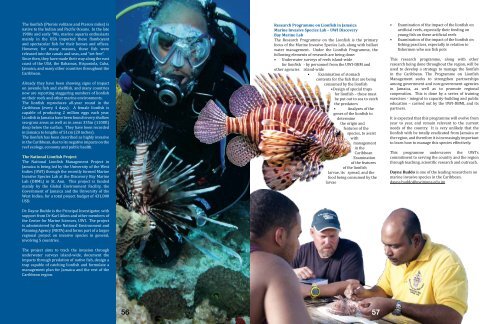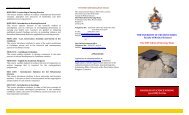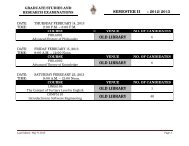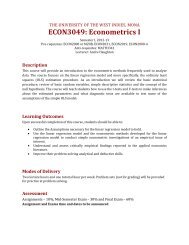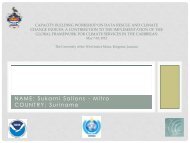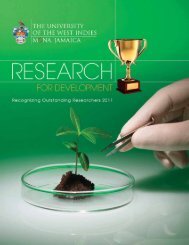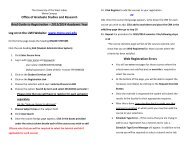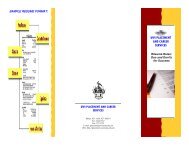Download Pdf - Uwi.edu
Download Pdf - Uwi.edu
Download Pdf - Uwi.edu
- No tags were found...
You also want an ePaper? Increase the reach of your titles
YUMPU automatically turns print PDFs into web optimized ePapers that Google loves.
The lionfish (Pterois volitans and Pterois miles) isnative to the Indian and Pacific Oceans. In the late1980s and early ‘90s, marine aquaria enthusiastsmainly in the USA imported these flamboyantand spectacular fish for their homes and offices.However, for many reasons, these fish werereleased into the canals and seas, and “set free”.Since then, they have made their way along the eastcoast of the USA, the Bahamas, Hispaniola, Cuba,Jamaica, and many other countries throughout theCaribbean.Already they have been showing signs of impacton juvenile fish and shellfish, and many countriesnow are reporting staggering numbers of lionfishon their reefs and other marine environments.The lionfish reproduces all-year round in theCaribbean (every 4 days). A female lionfish iscapable of producing 2 million eggs each year.Lionfish in Jamaica have been found in very shallowsea-grass areas as well as in areas 335m (1100ft)deep below the surface. They have been recordedin Jamaica to lengths of 51cm (20 inches).The lionfish has been described as highly invasivein the Caribbean, due to its negative impacts on thereef ecology, economy and public health.The National Lionfish ProjectThe National Lionfish Management Project inJamaica is being led by the University of the WestIndies (UWI) through the recently formed MarineInvasive Species Lab at the Discovery Bay MarineLab (DBML) in St. Ann. This project is fundedmainly by the Global Environment Facility, theGovernment of Jamaica and the University of theWest Indies, for a total project budget of 431,000USD.Dr. Dayne Buddo is the Principal Investigator, withsupport from Dr Karl Aiken and other members ofthe Centre for Marine Sciences, UWI. The projectis administered by the National Environment andPlanning Agency (NEPA) and forms part of a largerregional project on invasive species in general,involving 5 countries.The project aims to track the invasion throughunderwater surveys island-wide, document theimpacts through predation of native fish, design atrap capable of catching lionfish and formulate amanagement plan for Jamaica and the rest of theCaribbean region.Research Programme on Lionfish in JamaicaMarine Invasive Species Lab – UWI DiscoveryBay Marine LabThe Research Programme on the Lionfish is the primaryfocus of the Marine Invasive Species Lab, along with ballastwater management. Under the Lionfish Programme, thefollowing elements of research are being done:• Underwater surveys of reefs island-widefor lionfish - by personnel from the UWI-DBM andother agencies island-wide• Examination of stomachcontents for the fish that are beingconsumed by the lionfish• Design of special trapsfor lionfish – these mustbe put out to sea to catchthe predators• Analyses of thegenes of the lionfish todeterminethe origin andfeatures of thespecies, to assistwithmanagementin theCaribbeanExaminationof the featuresof the lionfishlarvae, its spread, and thefood being consumed by thelarvae• Examination of the impact of the lionfish onartificial reefs, especially their feeding onyoung fish on these artificial reefs• Examination of the impact of the lionfish onfishing practices, especially in relation tofishermen who use fish potsThis research programme, along with otherresearch being done throughout the region, will beused to develop a strategy to manage the lionfishin the Caribbean. The Programme on LionfishManagement seeks to strengthen partnershipsamong government and non-government agenciesin Jamaica, as well as to promote regionalcooperation. This is done by a series of trainingexercises - integral to capacity-building and public<strong>edu</strong>cation – carried out by the UWI-DBML and itspartners.It is expected that this programme will evolve fromyear to year, and remain relevant to the currentneeds of the country. It is very unlikely that thelionfish with be totally eradicated from Jamaica orthe region, and therefore it is increasingly importantto learn how to manage this species effectively.This programme underscores the UWI’scommitment to serving the country and the regionthrough teaching, scientific research and outreach.Dayne Buddo is one of the leading researchers onmarine invasive species in the Caribbean.dayne.buddo@uwimona.<strong>edu</strong>.jm56 57


